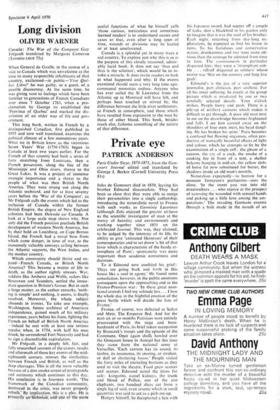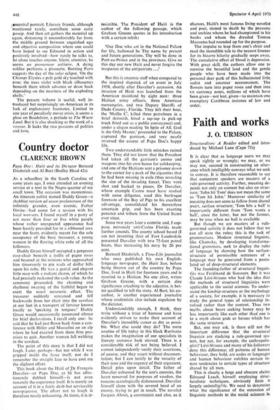Private eye
PATRICK ANDERSON
Paris Under Siege, 1870-1871, from the Gon- court Journal edited and translated by George J. Becker (Cornell University Press 81s) Jules de Goncourt died in 1870, leaving his brother Edmond disconsolate. They had been so close that they were able to merge their personalities into a single authorship, introducing the naturalistic novel to France with such works as Germinie Lacerteux (although Zola enjoyed the greater reclame as the scientific investigator of man at the mercy of heredity and environment) and working together since 1851 on the celebrated Journal. This was, they claimed, to be judged by the intensity of its life, its ability to give 'animated likenesses' of their contemporaries and to set down 'a bit of that fever which is characteristic of the heady at- mosphere of Paris'; spontaneity was more important than academic correctness and decorum.
To it Edmond now confided his grief : 'Days are going back and forth in this house like a soul in agony.' He found some consolation, however, in the public emotions consequent upon the approaching end to the Franco-Prussian war : 'In these great emo- tional crowds I feel my solitude less ... I lose the whole day in the frightful emotion of the great battle which will decide the fate of France.'
France, of course, was defeated at Sedan and Metz. The Emperor fled. And for the next six or so months Parisians were entirely preoccupied with the siege and bom- bardment of Paris, its brief token occupation by Bismarck's troops and the episode of the Commune. Once again shells howled over the Goncourt house in Auteuil but this time they came from the national army at Versailles. 'Each cannon has its sound, its timbre, its resonance, its snoring, or strident, or dull or shattering boom.' People visited the forty miles of encircling bastions as they used to visit the theatre. Food grew scarcer and scarcer. Edmond noted the items for sale : kangaroo, camel kidneys, the trunk and blood of Pollux, one of the zoo elephants, two hundred slices cut from a single leg of veal, even arsenic which in small quantities was said to act as a pick-me-up.
flungry himself, he decapitated a hen with
his Japanese sword, had supper off a couple of larks, shot a blackbird in his garden only to imagine that it was the soul of his brother. Each night, returning from day-long ex- plorations, he expected to find his house in ruins. To his fastidious and conservative nature, drunkenness and riot were more ob- vious than the courage he admired from time to time. The communards in particular disgusted him; they were a 'triumphant rab- ble . . . riffraff disguised as soldiers' whose motto was 'Shit on the country and long live grub'.
Edmond's is the eye of a very superior journalist, part clinician, part aesthete. For all his inner suffering, he excels at the group picture which is irradiated by one or two carefully selected details. 'Four o'clock strikes. People hurry and push. There is a pile-up of artillery caissons which makes it difficult to get through. A poor old man next to me on the drawbridge becomes frightened and falls. I see him carried away on the shoulders of four men, inert, his head dangl- ing. He has broken his spine.' Paris becomes a confused but flowing organism, often pro- ductive of ironically beautiful effects of light and colour, which he attempts to fix by the examination of a single cell: the gleam of a cannon, the cry of a cock, the smoke of a cooking fire in front of a tent, a shelled balcony hanging in mid-air, the yellow slabs of horse fat now substituted for butter, the shadows inside an old man's nostrils.
Naturalism expectedly—to borrow for a moment Tennyson's puritanism—stirs the slime. 'In the street you run into old streetwalkers . .. who rejoice at the prospect of caressing the wounded with sensual hands and picking up a little love among the am- putations.' The invading Germans excrete through a hole made in the mouth of an
,ancestral portrait. Literary friends, although mentioned rarely, contribute some catty gossip. And then art gathers the material up again, distancing it uncomfortably far from the middle ground between anguished ego and objective composition where one could have hoped to see Edmond in action and positively involved—how rarely he talks to, let alone touches anyone. Silent, attentive, he seems un promeneur solitaire. A dying soldier performs a pirouette. Burning Paris suggests the day of the solar eclipse. 'On the Champs Elysees a pale gold sky touched with rose; the trees violet with black silhouettes beneath them which advance or draw back depending on the nearness of the exploding shells.'
The present volume is useful, well in- troduced but surprisingly un-American in its lack of explanatory footnotes. Limited to one year of peculiarly messy crisis, it seems a gloss on Baudelaire, a prelude to The Waste Land. But it is also shocking as the work of a voyeur. k lacks the two passions of politics and love.



































 Previous page
Previous page